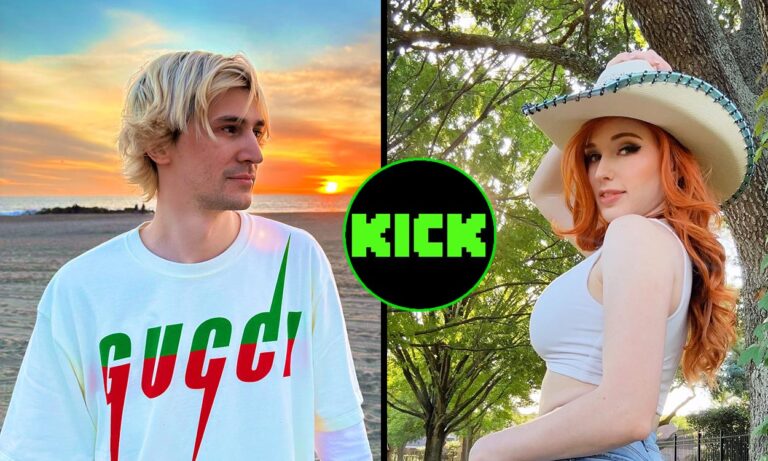Unpacking the drama behind Twitch stars Amouranth and xQc jumping ship to new rival Kick

Twitch was the internet’s first ever hub for watching people play games online, and was an instrumental player in the ever-growing popularity of live streaming and esports. Today, the platform is known for things like being behind the chess renaissance and Among Us fever which took over our lockdowns—as well as being more infamously known for its chaotic in real life (IRL) streams, and exploitative hot tub streams.
Throughout all of this, the service has long retained its crown, beating out the likes of Youtube, Facebook Gaming and even Microsoft’s ill-fated Mixer, all platforms who tried to take a stab at its streaming territory.
However, the long reigning king of live streaming may have finally met its match with mysterious newcomer Kick, a platform which hopes to exploit the ever growing divide between Twitch and its user base. The new live streaming platform has already managed to poach some of Twitch’s biggest names too including Amouranth and xQc. So, where did this newcomer come from and how much did it have to fork out to convince some of its rival’s biggest streamers to jump ship?
What is Kick and how is it different to Twitch?
Kick is the latest streaming platform hoping to pull users away from Twitch by focusing on a slew of key differences between the two. Something you’ll find unchanged between the two sites however is the design. One minute on Kick and it’s clear that the user interface has been crafted to make Twitch deserters feel right at home.
The site’s key differences lie in their approach to content and user relations. For example, gambling is fully welcome on Kick. Back in late 2022, Twitch finally cracked down on the unregulated slots and roulette wheels that had suddenly taken over the website, much to the dismay of users who had suddenly found an audience while flushing away their money.
Naturally, promoting gambling to children who use the platform wasn’t a good look for Twitch either, which prompted the live streaming hub to clamp down.
So, why is gambling welcome on Kick? You can thank the sites investing companies Easygo Gaming and Stake for that—online platforms for gambling away your hard earned cash. It’s clear that the loss of traffic to their sites and pay-ins to their sites after Twitch’s crackdown was a big motivator in the foundation of the new live streaming platform.
One of the biggest kickers, no pun intended, in Kick’s post-launch marketing campaign involves less restrictive rules for its users too, with one of the site’s latest promotional tweets actively mocking some of Twitch’s confusing, and restrictive new ad guidelines. Watch their tongue in cheek promo here.
#PickKick pic.twitter.com/hjHLdFtfTS
— Kick.com (@KickStreaming) June 20, 2023
Kick’s main selling point though? A 95/5 revenue split payout for its subscription service—a huge difference when looking at Twitch’s 50/50 split.
95/5. https://t.co/6tkZox5mRp
— Kick.com (@KickStreaming) June 16, 2023
For those that don’t know, Twitch offers its users the chance to subscribe to their favourite creators for the monthly cost of five dollars. Subscriptions grant users access to benefits like unique emoticons to use in the chat, as well as the chance to directly support the streamer.
However not all your money goes to the streamer, Twitch takes a 50 per cent cut. It’s a smart move from Kick to launch with such a generous split for streamers, and has been absolutely instrumental in getting people to jump ships. Whether Kick will keep up this generous split further down the line is another question entirely.
How much was xQc and Amouranth paid to join Kick?
Kick’s explosion onto the scene recently can be traced back to its acquiring of some major talent, namely in that of xQc and Amouranth, two of Twitch’s biggest previous names.
xQc, whose real name is Félix Lengyel, was reportedly signed by Kick for a staggering $100 million. This extortionately high number would make it the 12th biggest annual payout in all of sports, ahead of professional basketballer Kevin Durant, pointed out Dextero. The legitimacy of gaming as a career is here people, and it’s only on its way up.
The cosplaying, hot tubbing extraordinaire that is Amouranth was also signed by Kick. It is likely to be a similar payout to Lengyel but as of right now the amount remains undisclosed.
Is Kick safe?
Some of Kick’s recent moves have gotten the ball rolling as people grow increasingly fed up with Twitch’s practices, but is jumping ship to a site run by gambling dude-bros the best move? Despite a lot of frustration with the Amazon-owned streaming hub and its aggressive monetization of users content, there remains something distinctly fishy about Kick.
Marcus Graham, the former director of creative development at Twitch wrote in a Twitter thread from December 2022, that the companies behind Kick are actively misleading users by pretending to be a “creator first” platform, when in reality the main goal is to continue growing the online gambling industry, which was actively slowed down when Twitch sought to clamp down on it on their own site.
I've seen a lot of shit in my 23 years of internet broadcasting. I can say confidently that https://t.co/tCtGxi18VF is a sham. I can't sit idly by and watch nonsense be thrown out into the world as a beacon of hope for creators. This is where creators need to critically think.🧵
— djWHEAT (@djWHEAT) December 6, 2022
Transparency is important and while competition is generally better for consumers, online gambling is a dangerous, and addictive market—one that we think influential gamers should steer clear from.




